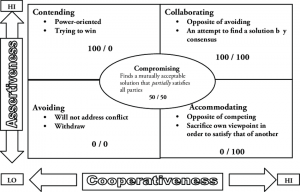
Although dealing with conflict is something most people tend to avoid, it can be useful when it raises awareness and provides insights that might not otherwise be uncovered. The word conflict usually carries with it quite a negative connotation. One can conjure up images of yelling, finger-pointing, road-rage, arguing, and other unhealthy behaviours.
It is not uncommon to believe that if you avoid conflict, you are good at managing relationships. However, disputes and differences are a part of every human experience. It happens between friends, family members, neighbours, coworkers, supervisors, and subordinates, as well as employees and clients. The goal – and the key point we’ll cover – is to develop healthy ways to address conflict.
It’s time to think about the positive side of conflict and consider how challenging, questioning, and debating can help you approach a difference of opinion that allows everyone concerned to discover a healthy, viable, outcome.
An Essential Skill
Learning how to resolve conflict is an important professional skill. If you are in a leadership role, it is critically important to be able to confidently navigate the workplace waters especially when the winds rise up and the waves get quite choppy.
Managing conflict is like other essential professional skills. Whether it be active listening, giving, and receiving feedback, emotional intelligence, or time management, they all require our attention and effort to see improvements.
A popular virtual workshop I lead is on Conflict Management. I address the core skills needed to become conflict competent, and in this post, I’ve included some highlights along with helpful links.
Speak Up? I think not.
The last few years have allowed us to encounter situations where polarizing views are unearthed and as a result, relationships have been tested. Never before have I noticed so much hesitancy regarding the sharing of opinions. I have to believe that a contributing factor is our volatile social climate.
Even if we don’t speak up, it doesn’t mean we don’t have opinions or beliefs. The fear of not knowing how the other person might respond can hold us back from sharing. Additionally, we might not know how to effectively address our differences. We are missing the map to help us find a way toward resolution without feeling mentally battered and bruised.
Suggested TED Talk to watch with Adar Cohen: 3 ways to lead tough unavoidable conversations
The Survey Says…
In a recent Harvard Business Review (HBR) article, a study of 1400 people that was conducted in late 2021 revealed that 90 percent of respondents felt emotionally or physically unsafe to speak their mind more than once in the last 18 months. Additionally, 39 percent of survey participants shared that they felt unsafe either every day or every week. The article highlighted that when we talk about topics that are emotionally or politically risky (and we’ve had our fair share to pick from lately), we tend to view the other person in a more negative light.
About Conflict
Conflict is defined as the perceived difference between the interest of two or more concerned parties. This difference, at least initially, is such that the parties do not believe their interests can be met, simultaneously. Both parties perceive there to be a sense of a threat to something they care about, regardless of whether the threat is real or not.
In the workplace, there are times when teams, and even members of the same team, have competing interests.
Also, conflict can arise when people feel micromanaged or when they believe others are questioning their work or their abilities. It can feel personal. When that happens, emotions are heightened, and it can be challenging to remain objective and level-headed.
Without learning helpful conflict management skills, we tend to just react, rather than thoughtfully respond to conflict. When we allow ourselves to react, we base our thoughts and comments more on our perception of the situation rather than applying our critical thinking and problem-solving skills.
“We don’t get harmony when everybody sings the same note. Only notes that are different can harmonize. The same is true with people.”
― Steve Goodier
Conflict Management
Also known as conflict resolution, it is the process by which two or more parties reach a peaceful resolution to a dispute. When conflict is handled well, it allows for greater opportunities for growth and learning. Working through conflict may help build trust in a relationship and allow the parties to know they can weather the storm.
Top Tips
- Don’t avoid conflict. An important self-leadership skill that HR practitioners and leaders alike look for is an employee’s ability to be conflict competent. They understand that when conflict goes unaddressed, it can cause a simple disagreement to fester into a much larger problem that can harm relationships, productivity, and employee engagement.
- Know your go-to approach. Take some time to reflect on how you’ve dealt with conflict in the past. How conflict-averse are you? Do you want to avoid conflict and hope it will go away if you ignore it, or are you conflict friendly?

The Thomas Kilmann Model is a helpful way to consider the different options for handling conflict. The two primary behavioural responses are assertiveness and cooperativeness. The image of the model is designed to show the five different ways people generally deal with conflict. Optimally, we’re looking for collaboration or compromise. Collaboration is the ideal outcome, but it takes time and may require quite a bit of effort for all concerned parties. - Avoid judging others – keep an open mind. Ensure you’re not seen as the “least preferred co-worker”(LPC). A 40-year research study reveals that people who tend to judge others more harshly were considered the least preferred co-worker. The LPC tended to be the person who was observed as being far more task-oriented than people-oriented. Access the free LPC Scale here.
- Avoid jumping to solution mode first! Since humans are inherently problem-solvers and we are uncomfortable with staying in conflict mode for any length of time, we want to move to solution mode as quickly as possible. The solution should come after a thoughtful process of considering the options and keeping an open mind. Just imagine that your thoughts and beliefs might not be 100 percent correct all the time.
- Actively listen. Pay attention to the verbal and non-verbal cues and really listen for the essence of what the other person is communicating. Do not interrupt.
- Practice empathy. This means imagining you are putting yourself in someone else’s shoes. Watch this 3-minute video for quick tips on how to apply empathy.
- Apply the Conflict Resolution process. Here it is:
- Agree that conflict exists. Name the conflict, problem, or difference.
- Agree to address the issue and make the effort to work through to resolution.
- Make time to understand and consider the perspective and concerns of the other party.
- Recognize what emotionally triggers you and note the same for the other party (when possible) and acknowledge emotions (yours and theirs).
- Be willing to compromise or collaborate.
- Brainstorm a range of options. Meet to come up with a resolution that allows for both parties to be able to move forward. This requires focusing on mutual interests of the parties involved.
Just Scratching the Surface
There is so much more to uncover on this topic. Give a few of these tips a try and if nothing else, consider stating a difference of opinion regarding a topic that does not fully engulf you in a sea of emotions. Consider a small experiment where you engage in a conflict resolution in a small way. Like so many other things, you’ll only get better with practice.
Conflict is normal. It happens to all of us. And remember, avoiding it won’t make the problem go away. So, in the words of Adar Cohen – move toward conflict, you don’t know anything, and keep quiet.




